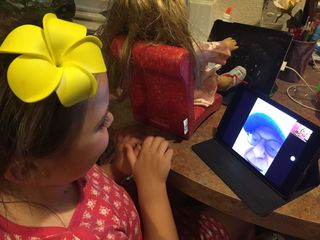Health
Coping During a Crisis
Weather this storm by relying on values, self-care, and functional adaptation.
Posted March 15, 2020
My university students are on an extended spring break, my therapy clients are being seen by phone and video chat, and my course development team and I are planning for an extended period of telecommuting. COVID-19 is here, new and menacing and spreading like wildfire. Gatherings and group events all over the country have been canceled. Hand sanitizer and zinc lozenges are out of stock everywhere. Health care workers and essential personnel of all kinds are overworked.
Many children (including mine) are home from school with nothing to do but soak up adults' collective anxiety—their spring break camps, trips, and group activities have been canceled, and prolonged school closures are anticipated to follow spring break. People are practicing "social distancing"—hunkering down in our homes, praying for the plague to pass over. The economic and social implications of the spreading illness are already dire. No matter how the COVID-19 epidemic plays out in the coming months, it is clearly a crisis already.
We can all feel the tension. Between worrying about my aging parents, trying to transition all my work tasks to remote methods, encouraging my immune-compromised patients to self-quarantine, wiping down all the doorknobs and electronics in my life multiple times a day, watching the economy take a nosedive, and attempting to keep my kids safely occupied at home, I can't say I've been paying much attention to my self-care... until I realized I needed to respond deliberately to this crisis, not just react to it.
We all need to be able to go the distance in this viral marathon without falling apart under the added stress! So I'm taking a few minutes today to remind us all that we want to respond thoughtfully to this admittedly anxiety-producing situation. Here are a few tips for making it through:
1. Remember your values. The opportunity to act according to our deepest priorities is one of the great benefits of having to weather crises. Life-or-death threats remind us of what matters in the grand scheme. You know it, and I know it: So let's act on it!

What's most important to you about who you are? Generosity, reliability, integrity, responsibility, humor, compassion? Do it. Live it. Show yourself, the people you love, and your broader community your best self.
Be patient, tolerant, and engaged with your kids, and show them values-based leadership firsthand. Pay attention to and abide by CDC and WHO guidelines and recommendations in order to protect those in high-risk categories, even if this causes you inconvenience or financial loss. If you are in good health, see where you can help out in your community.
Do what you know is right. If we can get through this with our values intact, we will feel the sweet satisfaction of moral maturity and the reassurance that we are doing our part to mend our civilization's social fabric.
2. Try not to panic. I know, I know: It's easier said than done. But there is a lot we can do to slow our ride on the anxiety train.
Try some breathing and relaxation exercises, systematic muscle relaxation, or positive visualization. Meditate. Try doing expressive writing about your feelings for a few minutes for several days in a row. Limit your exposure to crisis talk: Tune into a reliable source of public information once or twice a day to stay informed, but avoid bingeing on social media output about the crisis.
Practice thinking about this situation in terms of challenges rather than threats. Watch out for the common cognitive distortions, "catastrophizing" (focusing on the worst-case scenario) and "minimizing positives" (ignoring reassuring or hopeful information); they are easy to engage in but counter-productive. Remind yourself that you will be able to bounce back from this, even if the way forward isn't always clear at any given moment.
Reach out to a mental health professional for support if you need it—many of us are working, using a variety of video-chat and audio technologies. One helpful resource is Psychology Today's Find a Therapist feature. And emergency services like 911 and hospital emergency departments remain fully operational. Another awesome mental health resource is the crisis text line, 741741, a great way to connect to a caring human 24/7/365.
3. Take care of yourself. Now is not the time to stop exercising and eat too much pie. Well, for me it has been, but I'm working on it! It's understandable to be swayed by this crisis toward coping mechanisms inconsistent with our health goals, but we can mitigate the negative effects of this situation on our self-care behaviors if we try!

Renew your commitment to self-care. With intention and effort, we can work around new limitations. We can do yoga to online videos in our living rooms rather than going to a class; we can walk, run, or bike around our neighborhoods rather than going to the gym. We can remind ourselves of sleep hygiene and its simple guidelines for getting a better night's rest.
We can make wholesome, nutritious meals at home rather than resort to over-processed convenience foods or ordering in. We can drink plenty of water and resist the temptation to empty the liquor cabinet. We can slow down and pause and breathe and tell ourselves how amazing we are for doing all the amazing things we do. Remember: The better you take care of yourself, the more available you can be to those who depend on you.
4. Distract yourself. Keep busy and amused, varying your activities and remaining active and socially interactive, without breaking rules of containment for slowing the spread of the virus. Spend time in your backyard or on your porch or balcony. Have a household dance party in the living room.

Use video chat technology to stay in touch beyond texting and voice calls. Clean the house, or put the kids to work doing it. What have you got around the house that could provide opportunities for productive activities under these circumstances? Meat in the freezer and time to BBQ? Arts and crafts supplies gathering dust in a corner? Games and puzzles hiding in a cabinet, waiting for the moment when your kids are bored enough to play them??
Get some gardening done. Clean out your junk drawer. Rekindle an old hobby. Make a photo album or a home movie. There's nothing wrong with relying on technology—electronics like TV and video games are powerful and useful distractions, and computers allow us to enjoy a wide range of virtual activities. However, to avoid becoming bored and dysregulated, remember to vary your electronics with other types and modalities of stimulation.
5. Engage in positive thinking. We must endeavor to accept disappointments associated with this gracefully: From the SXSW festival to spring break pottery classes to volleyball season, everyone in my family had something important to them canceled due to COVID-19. It isn't always easy, but we must remain grateful and humble in the recognition that others have sustained greater losses.
Economic and social costs are minor concerns relative to the risk to human life. My mother is in her late 70s, with chronic health conditions. The COVID-19 protection plan she has implemented for herself is impressively thorough and sensible; she stands as an example of how to rise to this challenge with dignity.

We must embrace whatever aspects of this we can find to appreciate, notice the things in our lives to feel good about, and count our blessings large and small: The illness appears to be milder in children than in other vulnerable populations (a relief to all our hearts); my husband is baking homemade banana bread as I type this (it smells so good); and this week, I may just find time to catch up on a few projects around the house (we'll see!).
It isn't ignoring suffering to hope; it isn't disrespectful to be happy. Allowing ourselves to become terrified or despondent will not help those endangered by this illness. We must stay strong and mentally well for the people who need us to show them how to live in a challenging world. Try to keep a hopeful, optimistic attitude, even when this means we must dig deep to find whatever provides us with light when we get scared in the dark.

We are going to get through this. We must keep our wits about us and remain engaged in the present while refusing to lose sight of a reassuring future, both scientifically and existentially. We must respond deliberately to this crisis with:
- A renewed commitment to the positive expression of our moral values in our behavior with our family members and neighbors
- Self-care strategies to reduce our stress and ease our reactivity to our collective anxiety
- Acceptance that this time of suffering entails great challenge—and the opportunity to prove our positive resilience as individuals, as parents, and as a society with dignity and grace




